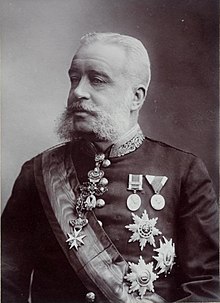Agenor Maria Gołuchowski
|
Agenor Maria Gołuchowski Count |
|
|---|---|
 |
|
| Chairman of the Ministers' Council for Common Affairs of Austria-Hungary | |
|
In office 16 May 1895 – 24 October 1906 |
|
| Monarch | Franz Joseph I |
| Preceded by | Count Gustav Kálnoky |
| Succeeded by | Count Alois Lexa von Aehrenthal |
| Personal details | |
| Born | March 25, 1849 Lwów (Lemberg), Austria-Hungary |
| Died |
March 28, 1921 (aged 72) Lwów, Poland |
| Citizenship |
Austria-Hungary Poland |
| Nationality | Polish |
Count Agenor Maria Adam Gołuchowski - Trzaska coat of arms - (March 25, 1849 in Lwów (Lemberg at the time), Austria-Hungary – March 28, 1921 in Lwów, Poland) was a Polish statesman. Born to Count Agenor Gołuchowski, Agenor Maria inherited much of his father's wealth. Between 1895 and 1906 he served as the Minister of Foreign Affairs of Austria-Hungary. He was responsible for a period of détente in Austrian relations with Imperial Russia, harmed due to the Austrian and Russian struggle for control of the Bosporus. From 1907 he headed the Polish Group in the House of Lords, the higher chamber of the Austro-Hungarian parliament.
His father, descended from an old and noble Polish family, was governor of Galicia. Entering the diplomatic service, the son was in 1872 appointed attaché to the Austrian embassy at Berlin, where he became secretary of legation, and thence he was transferred to Paris. After rising to the rank of counsellor of legation, he was in 1887 made minister at Bucharest, where he remained until 1893.
In these positions he acquired a great reputation as a firm and skilful diplomatist, and on the retirement of Count Kálnoky in May 1895 was chosen to succeed him as Austro-Hungarian minister for foreign affairs. The appointment of a Pole caused some surprise in view of the importance of Austrian relations with Russia (then rather strained) and Germany, but the choice was justified by events. In his speech of that year to the delegations he declared the maintenance of the Triple Alliance, and in particular the closest intimacy with Germany, to be the keystone of Austrian policy; at the same time he dwelt on the traditional friendship between Austria and Great Britain and expressed his desire for a good understanding with all the powers. In pursuance of this policy he effected an understanding with Russia, by which neither power was to exert any separate influence in the Balkan peninsula, and thus removed a long-standing cause of friction.
...
Wikipedia
